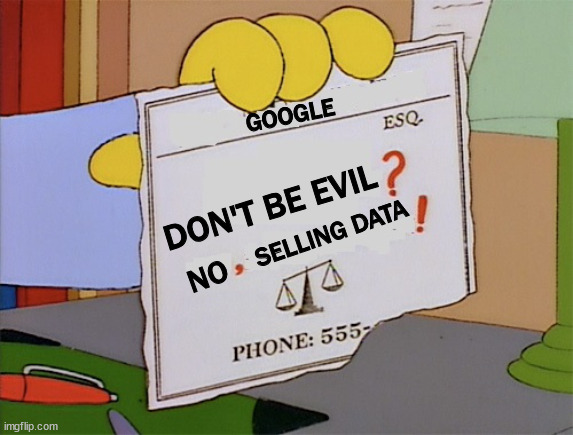Hahahahaha, damn Google.
“Help us prevent government from stopping us from being bad actors”.
Don’t be evil :)

Oh that’s perfect
I love how ambiguous they’re being, because “lawmakers are proposing regulations that protect consumers from our invasive surveillance which maintains our monopoly on advertising so we can charge you more money” just doesn’t have that same ring to it.
Google encourages “protecting your business against costly state regulations”
Just remove the ‘y’ from ‘your’ and the sentence goes from lie to truth.
This is the same route they take when saying social media can’t be regulated. Small Businesses.
Think of the Small Business is the corporate equivalent of the Think of the Kids fallacy
Add onto the pile of no Facebook, no Amazon, no Microsoft, no Apple.
I prefer MANGA - Meta, Apple, Netflix, Google, Amazon
Haha, a strong state would benefit small businesses more
I think there’s some confusion over the intent here.
Lawmakers in state capitals across the country […]
So based on this, Google is using “state” here to mean a US state and not the more general meaning of government.
For large corporations like Google, each state having its own local regulations (e.g. privacy regulations such as CCPA) is expensive because they have to account for different rules in different places, which means whole teams of legal experts just to be familiar with each state’s regulations and interpret what they mean for operating the business.
It’s also problematic in a technical sense, because on the internet how do you know if a particular user is a legal resident of Texas or Colorado or New Hampshire, and would even knowing that be a violation of their privacy rights?
So the intent here is to push federal regulation over state regulation, because it makes the legal and technical problems simpler.
Ultimately this is an argument against the way the Republican party does things, where they reject federal regulations saying that the states should be allowed to regulate themselves and that federal regulation is an overreach. This leads to weaker protections for citizens and weaker enforcement, which is the Republican party’s real intent. Every US citizen should have privacy protections, not just residents of California.
It’d be great if California’s consumer privacy protections could be applied at the federal level, but as long as the Republicans retain the presidency, either house of congress, or the Supreme Court, it would either never get passed or simply get struck down and returned to the state regulatory level.
Absolutely, that’s the problem that Google is targeting here. Republicans like to claim that federal regulation is bad for businesses, but in reality it’s state-level regulation that makes it harder for businesses to operate.
Not to be super pro-Google, this is purely self-interested for them. But it seems like people are interpreting this as Google being anti-regulation in general, and I don’t think that’s correct.
Yeah, there’s a missing comma.
Don’t, be evil.
There. Fixed it.
What could be more evil than failing to protect their big cash payoffs???
There can’t be a comma missing from a motto which is itself entirely missing. They threw it in a ditch a few years ago. (I’ll be honest, I thought it had to have been at least 10 years at this point, but Wikipedia says otherwise.)
Yeah, it was a joke. I know.
Protect your business against protecting people.
They are ashamed to put that fucking shit on their own domain name.
Not to defend Google, but it has nothing to do with shame and everything to do with marketing.
If you read the URL as a sentence supportsmallbiz.withgoogle.com = Support Small Biz With Google
They could have done smallbizzwith.google.com but are hiding it and they will pretend that it doesn’t exist once they shut down the site. We’ve seen this already a few time at various companies.
How is that any more hidden? Unless you already know the subdomain in the first place, the domain doesn’t really make much difference.
A bit more plausible deniability













